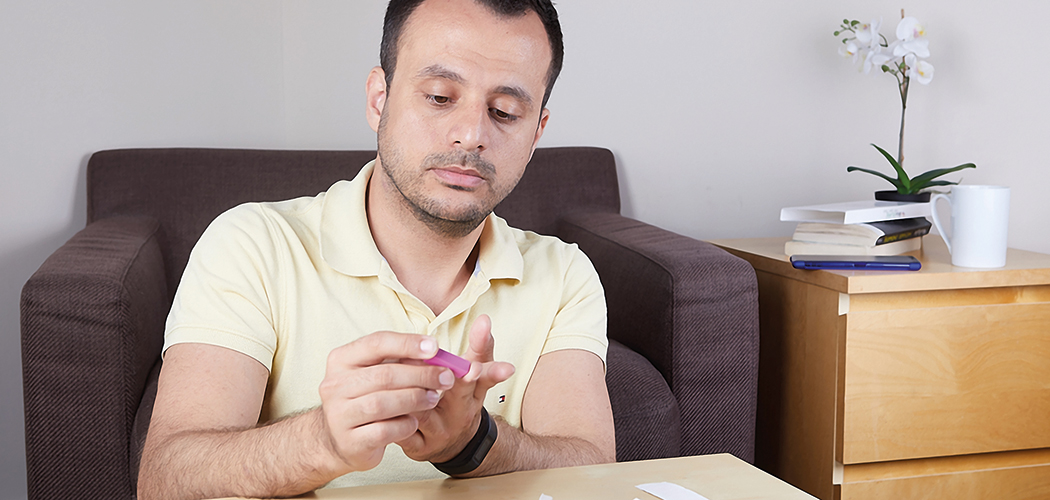Each month in Boyz the team from NAM aidsmap report the latest news on HIV and sexual health. Keep up to date and read more on their website at aidsmap.com
When testing for HIV by yourself, two types of kits are available. One is self-sampling: you take a fingerprick blood sample yourself but send it off to a lab to be analysed. The other is self-testing: you take the sample and do the whole test yourself, including reading the result. Which one would you prefer to use?
The online sexual health service SH:24 wanted to find out more about people’s preferences, so for two weeks they offered people a choice between a free test kit of either type. They gave people information about the advantages and disadvantages of each.
Advantages of self-sampling include having professional staff perform the test in a laboratory and, if it might be positive, explain the result over the phone. Disadvantages are a 72-hour wait for results and needing a larger blood sample than self-testing.
No test can detect HIV infection immediately, and a test’s ‘window period’ is the time gap between infection and when it can give a reliable result. The window period for self-sampling is one month.
Advantages of self-testing are having the result within 15 minutes and a smaller blood sample. However, this test has a three-month window period. You will also need to manage the testing process yourself, including getting the result, without any immediate professional support.
Given the choice, two-thirds of people chose self-testing, but the other third preferred self-sampling.
The main reasons for choosing self-testing were the immediate result and being able to complete the test yourself. Some people added that privacy and less blood being required were also important.
Although most people preferred self-testing, it is not available yet for free or from the NHS; the kits are sold for £29.95. On the other hand, a free self-sampling service is already available in most areas. The study suggests that both options should be made available.
Read more at aidsmap.com/node/31955
No-deal Brexit and HIV treatment
There is little clarity about how UK citizens living elsewhere in the European Union (EU) would continue to get HIV treatment in the event of a no-deal Brexit, legal experts say.
They looked at the situation in Spain, as a third of the UK citizens living in the EU live there.
If the UK remains in the EU, British citizens living in other European countries will continue to have access to health care, as guaranteed by EU law. Similarly, if the UK government were to resurrect Theresa May’s withdrawal agreement, this would safeguard healthcare rights for UK citizens resident in other EU countries.
But if the UK leaves the EU without a deal, it’s unclear how UK citizens living with HIV in Spain will get health care. Eventually, the UK and Spanish governments might come to an agreement about healthcare for their citizens living overseas, but for the moment there is nothing in place.
This leaves UK citizens in Spain with three options:
Pay directly for their anti-HIV medication – around €8000 a year.
Get private medical insurance – which will be expensive for people with a pre-existing medical condition.
Buy an individual subscription to the Spanish health system – but HIV treatment will not be covered.
They will also need to get a residence visa.
Read more at aidsmap.com/node/31865
New form of PrEP in the United States
PrEP is medication you can take to prevent HIV infection. It usually consists of two drugs in a single pill: tenofovir disoproxil fumarate and emtricitabine. The brand names this pill is sold under include Truvada, Ricovir-EM, Tenvir-EM, Tenof-EM and Tavin-EM.
Now a new form of PrEP has been made available in the United States. It contains the same two drugs, except that one of them (called tenofovir alafenamide) is a newer version. Its brand name is Descovy.
Is Descovy better than the PrEP we have already? A study that compared them showed that there was no difference in their ability to stop people getting HIV. They were equally effective.
In terms of side effects, the newer Descovy pill seems to have less impact on kidney function and bone strength – though in practice, medically important side effects have only been seen in a few PrEP users. On the other hand, it results in some people having increased cholesterol and putting on weight.
Perhaps the biggest difference is the price. The new pill is protected by patent so is only available from one company at a cost of over $1000 per month. Already in the UK (and soon in the US), the older version is available from a range of companies who compete on price. For example, you can buy a month’s supply for as little as £17.50 from the PrEP Shop at 56 Dean Street.
The newer pill might be available in the UK and other European countries sometime next year. But it’s not clear whether the NHS will consider that relatively small improvements in safety will be worth the extra cost for most people.
Read more at aidsmap.com/node/31903
Exercise, depression and anxiety
Exercise is a good way for people living with HIV to reduce symptoms of depression and anxiety, researchers say. As well as the benefits for physical health, exercise can also boost your self-esteem, help you sleep better, release feel-good hormones that give you more energy, reduce levels of stress hormones, and help you get together with other people.The researchers compared people following a structured exercise programme with people who were not. Symptoms of both depression and anxiety were reduced, although the findings were more reliable for depression. The greatest benefits were seen with aerobic exercise.
Read more at aidsmap.com/node/31827

For more of the latest news and information about HIV and sexual health visit aidsmap.com














